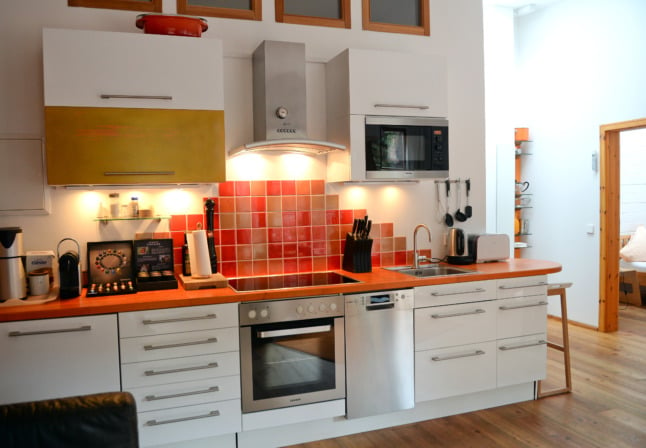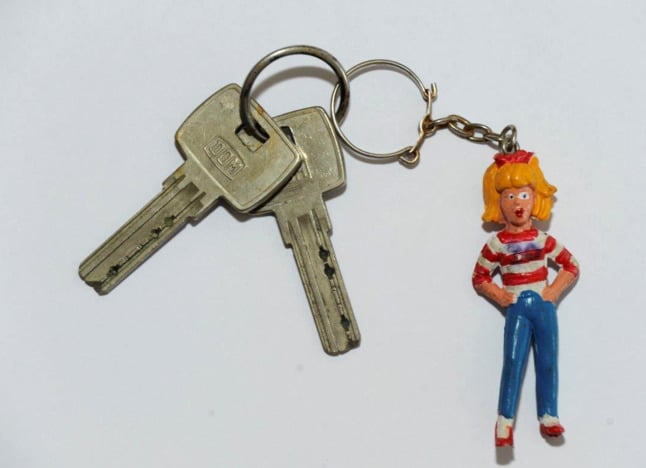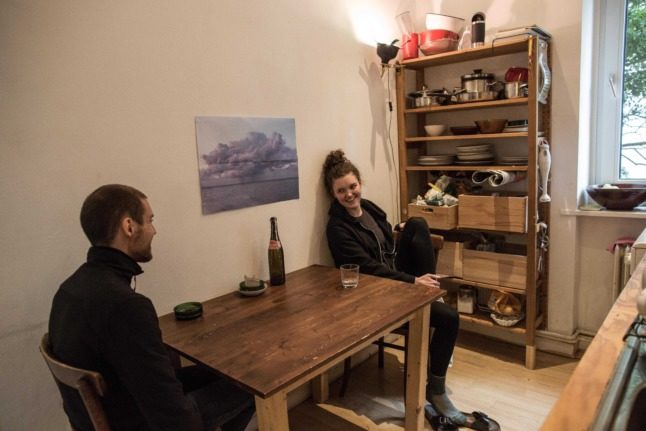Every country has its own unique set of quirks when it comes to finding a flat – and rule-loving Germany is no exception.
From extra expenses you may not have budgeted for to weird and wonderful rules for tenants, it’s easy to get tripped up on the rental market, especially if you come from abroad.
To help you on your way, here’s our guide to six of the most confusing things about renting in Germany, and some helpful tips for getting around them.
1. You need to know how rooms and floors are counted
If you’re renting a flat, you’ll want to at least know what size it is and where it’s situated in the building. Sounds simple, right? It certainly should be – but for first-time tenants in Germany, nothing is quite what it seems. In places like the UK and the United States, flats or houses are generally described by how many bedrooms they have – which of course is an important thing to know if you have a certain amount of people who need to sleep there. That means that a two-bedroom apartment is likely to have two rooms that could work as bedrooms, then at least one living room, a kitchen and a bathroom.
In Germany, however, living rooms and bedrooms are lumped in together as ‘rooms’, so something described as a two-room apartment will have one bedroom, one living room (or second bedroom), a kitchen and a bathroom. With a one-room flat, you just get a living room and bedroom rolled into one, studio-flat style – though the kitchen is likely to be separate.
The other thing that may confuse Americans is the way floors are counted in Germany (and indeed most of Europe). While Americans tend to refer to the floor at street level as the ‘first floor’, Europeans describe this as the ground floor – or, in German, the Erdgeschoss. That means the first floor (1. Etage) is the floor just above street level, which Americans would know as the second floor, and so on. The floor below ground level is the Keller and the one right at the top is the Dachgeschoss (literally, the floor under the roof).
Top tip: Ask to see a Grundriss (floor plan) of the building and your specific apartment before visiting to ensure you have a good idea of where it’s situated and how it’s laid out.
READ ALSO: Eight unique words and phrases that tell us something about Germany
2. The deposit alone could rinse your savings
If you’re flat-hunting in Germany, you’ll definitely need some money on reserve. As well as costs of your first month’s rent, furniture and money spent setting up contracts, it’s incredibly common to be asked for two or even three times the monthly rent as a deposit – so if your new place costs €1,000 a month, you could be asked to pay as much as €3,000 right off the bat. Generally, deposits are a landlord’s insurance against lost rent or damage to the property, and you’ll likely have to pay it even if you’re a reliable person with a brilliant credit rating.
The good news is that you should generally get this money back in full when you move out – though people can occasionally get caught out if they’re unsure what condition they need to leave the place in. It’s not uncommon for tenants in Germany to repaint the whole flat to ensure it’s in the same condition it was when they first arrived.
Top tip: Know your rights and responsibilities. According to the Berlin Tenants’ Association, the highest deposit a landlord can ask for is three times your net rent (excluding bills). This can be paid in instalments from the date you move in – so a third of it on top of your first month’s rent, a third on top of your second month’s rent, and the final third on top of your third month’s rent. Before moving out, check with your letting agent or landlord what they expect you to do to put the flat back in peak condition.
3. Tenants have to buy their own kitchen and appliances
This is one that catches out a lot of foreigners: when you move into a new flat in Germany, don’t expect to find it set up with things like fridges, ovens and dishwashers. This may seem incredibly strange for people from other countries who are used to hopping from flat to flat and simply unpacking their stuff or building some flat-pack furniture, but it makes sense when you think about how renting is viewed in Germany.

A modern kitchen in a Berlin flat. Many tenants purchase their own kitchens after moving into a German flat – and often take them with them when they leave. Photo: picture alliance / dpa | Britta Pedersen
According to Statista, more than 50 percent of the population are tenants rather than home-owners and traditionally, people in Germany tend to stay in their flats a long time. That means they often kit the places out with a nice kitchen and appliances that they’re then keen to take with them when they leave.
However, it makes things tricky now that the rental market – particularly in cities – is getting more expensive and it’s difficult to find a flat. If you have to hop through a number of undesirable flats in Berlin or Munich, for instance, as you try to find the perfect resonably-priced place, kitting out with kitchen appliances each time would be a nightmare.
Top tip: Check with the landlord or letting agent beforehand whether the kitchen is included. Sometimes the landlord will say a kitchen is included and they mean there is a single oven (yes, it’s frustrating). If you don’t want to go through the rigmarole of building or buying your own kitchen, see if you can purchase some appliances off the former tenant for a discounted rate.
4. Bills aren’t included in the cost of rent
For anyone used to simply having a thing called ‘rent’ that includes all your costs, it can be confusing to arrive in Germany and find that there is, in fact, more than one type.
Even more confusingly, the different types of rent apparently have different temperatures, and can either be described as cold or warm. The Kaltmiete (or cold rent) is the basic amount you pay for the use of the property, while Warmmiete (warm rent) is the full amount you pay for rent, services and utilities such as heating, water and internet. To find out your Warmmiete, simply add your Nebenkosten (additional costs) to your Kaltmiete. This should be the total amount you pay each month.
Top tip: Struggling to remember the difference between ‘warm’ and ‘cold’ rent? This may help: if you don’t pay any bills, your flat may well get rather cold in winter – so the warm rent is the rent for the flat, plus bills such as heating. In other words, your warm rent is the rent you pay for a warm flat. However, note that sometimes heating, electricity and Internet bills are separate to the rent so factor that into your budget.
READ ALSO: Moving house in Germany: 7 things you need to know about setting up utility contracts
5. It can be hard to know who to speak to
One of the most confusing things about renting in Germany can be knowing who to turn to if you have a problem. If something breaks in the flat, should you be contacting the landlord (Vermeiter) or the caretaker (Hausmeister)? If you move in and something doesn’t seem right, is the previous tenant (Vormieter) to blame – or perhaps the letting agent (Hausverwaltung)?
What if you’ve moved into a shared flat as an Untermieter (subletter) and the main person you have contact with is the main tenant (Hauptmieter) or just someone else you live with (your Mitbewohner)?
If you’re unlucky enough to have lost your Sicherheitsschlüssel (security key) and need a replacement, there could even be another person thrown into the mix: the highly specific Schlüsseldienst (locksmith) who you will have to visit to get your replacement key. Just be sure to contact your Vermeiter or Hausverwaltung first to get the appropriate paperwork – and don’t be surprised if the locksmith has a business in a completely different district of the city, as well.

A pair of security keys on a keyring. If you lose one of these, you may well have to contact a number of people to get a replacement. Photo: picture alliance / dpa | LKA Sachen-Anhalt
Top tip: The person or organisation you sign your contract with is likely to be your first port of call when dealing with most issues in the flat. Generally, this will be the Hausverwaltung, a letting agent responsible for dealing with tenants on behalf of the landlord. Don’t be afraid to ask what the process is for issues such as broken appliances when you move in – and be sure to check their office hours to know when they’re available to take your calls.
6. You can only make noise at specific times
For people from countries with a much more lassaiz faire approach to living together, it can be shocking to discover just how regulated your life is when living in a flat in Germany.
From sorting your rubbish properly to parking in the wrong size parking space, you may find yourself breaking rules you didn’t know you existed – and the issue of noise is no exception.
Almost country-wide, there are specific times of the day, week and calendar where you’re legally obliged to avoid making too much noise. These include public holidays, Sundays, midday from 11-3pm and at night between 10pm to 6 or 7am. So if Sunday used to be your housework day, don’t be surprised to see a disgruntled neighbour shouting “Sonntagsruhe!” at you from their balcony as you blast your vacuum cleaner while listening to the radio. Of course, this does cut both ways – so you shouldn’t have to put up with techno at 3am on a Wednesday from that party flat below you, either.
Top tip: Though the rules around making noise are generally set in stone, you shouldn’t get into trouble for breaking them if nobody complains. That means that, if you really need to do some DIY on a Sunday or you want to play some music on a Saturday night, giving the neighbours a heads up and asking if they have any issues with it beforehand could get you a free pass once in a while.
READ ALSO:




 Please whitelist us to continue reading.
Please whitelist us to continue reading.
Member comments